- Home
- Tim Lebbon
Berserk Page 2
Berserk Read online
Page 2
“Love you too,” she said, already standing to prepare for work. “I’ll be home a bit later tonight, I need to finish this design before the end of the week.”
“I’ll cook tea,” Tom said. He smiled, and when Jo gave him a smile in return he saw the real, sad depth to her that no banter or play could ever hide.
* * *
That lunchtime at work, Tom booked a cottage on the edge of Salisbury Plain for the second weekend in October. It was a remote location, set just outside a little village, an old cottage with two bedrooms, a downstairs toilet, an open log fire and a cold-room beneath the kitchen where occupants had once stored their meat and other perishables. It was a ten-minute walk from the nearest pub and restaurant, and a half-hour drive from the military areas of Salisbury Plain. If Steven’s ghost haunted the Plain, Tom and Jo would be within shouting distance.
Tom often wondered about ghosts. Steven is always with us, Jo said, but she meant as a memory, the reality of him retained by their never letting his moment in life fade away. But when they were dead and gone, what then? Would their son become nothing more than a number in an Army report, a photograph, an occasional thought for his surviving friends? And after that . . . nothing. How could someone so alive suddenly become so dead? Tom hated this way of thinking, yet he had always had a mind prone to exploring the more esoteric areas of life, and Steven’s death encouraged that rather than lessened it. Some nights, napping on the settee next to Jo, he found himself wandering the moors, drifting above those dark acres of fern and grass, skipping across marshland, passing through occasional small woods where animals lived from year to year without ever seeing a human being. And occasionally, in the darkest moments, he saw Steven roaming the Plain, confused at his sudden death, crying . . . crying for his mother and father . . . because he was far too young to die.
Tom would open his eyes, stare at the familiar four walls of his home, and despair at the brief but intense sense of hopelessness that always followed.
It was a bad afternoon. He sat at his desk and stared out the window, occasionally shuffling papers or opening up new files on his computer to convince himself, at least, that he was working. Steven was there as always, but there was also the huge chasm of emptiness and regret that threatened to swallow Tom whole; regret at a life wasted behind a desk, watching his ambitions and drive rot beneath an assault of nine-to-five indifference; and the emptiness in his own mind, where once had dwelled such grand aspirations. He had always regarded his job as a means to an end, but he had never come close to achieving that end. He sat at his desk for five days each week crunching numbers and paying for his mortgage, forever mourning the career in music that continued to elude him. So many opportunities taken up and blown away, so many deals scuppered because of bad luck or his own stupidity. The fact that he had barely played a note since his son’s death did little to quell his regrets.
In their third bedroom Tom’s instruments sat on their stands, monuments to lost dreams. They had once been the means by which he hoped to make his mark on the world, but now they merely took up space and drew dust, all potential long since echoed away to nothing. These walls had heard wonderful music, but they gave none back. He would stand in that room sometimes and wonder whether he had changed anything at all. Had a bird heard him playing and changed its course? Had the molecular make-up of the house been subtly altered by the vibration of his double bass, the sweet serenade of his guitar? Was there, anywhere in the world, evidence of the talent he had squandered?
Sometimes he believed that the ghost of his music wandered the Plain with the lost spirit of his only son.
But today, with autumn sunlight making beauty from dying leaves, there was something else on his mind. That doubt, risen from its uneasy grave. And the old anger at the lies they had been told, still tempered by grief, but no longer quashed by its intensity.
By the end of that afternoon, Tom needed to do something productive. He left work early and walked to the pub, hoping against hope but realising how foolish and naïve he was being. And yet he was still not completely surprised to see Beer-Gut sitting at the same table he had shared with his friend that previous Friday, alone this time, pensive and scared.
* * *
“Can I get you a drink?”
“Oh shit, I didn’t think you’d be here!” Beer-Gut stood at his table, wide-eyed. He looked toward the door as if searching for an escape.
“But you came anyway?”
The big man shrugged. He was breathing fast, eyes averted, perhaps going over whatever he had to say in his head.
“Guilt’s a weird thing, isn’t it?”
“Look, don’t fuck with me like that,” the man said quietly, staring at Tom for a few seconds before looking away again.
“I’m so sorry,” Tom said, shaking his head, meaning it. He offered his hand. “I’m Tom Roberts.”
Beer-Gut shook his hand; he had sweaty palms, but a strong grip. “Nathan King.” He sat back down.
“Pleased to meet you.”
King did not echo the sentiment, and Tom realised that this was probably the very last place he wanted to be right now. His whole manner – the shifting eyes, tapping fingers, frequent sips from his glass – projected nervousness and disquiet.
“Let me get you a refill,” Tom said. At the bar he took a few moments to compose himself, and he was suddenly hit by a cool, inexplicable terror. I may discover something terrible now, he thought. Something I haven’t known for ten years, and something it may be best I never know. Nothing will bring Steven back. We have a life, Jo and I. We deserve to live it in peace. He paid for the drinks and carried them back to the table, and his deeper inner voice spoke up, the one that occasionally rose to see past the bullshit. Truth deserves a chance, it said.
Tom sat down opposite Nathan King and prepared to have his life changed again.
* * *
It took King several minutes to begin speaking.
The two men sat there silently, letting life wash by in the swish of coats and the waft of end-of-the-day body odour. Tom watched the barmaid drop her tips into a glass behind the bar, smiling at each customer and making them all think they were special. He listened to the bland pop song whispering from the jukebox. He smelled the sharp tang of fatty burgers and chips cooking in the kitchen, a haze of smoke blurring that end of the big room. In one corner an elderly couple sat next to each other without speaking, the contact of their arms communication enough. The man was drinking stout, the woman wine, and Tom wondered how many children and grandchildren they had. People lit cigarettes, laughed, coughed, drank, stared, and none of them were aware of the tension between him and King.
At last King finished the pint Tom had bought for him, placed the glass carefully on the table, sat back and sighed. “I didn’t know your son,” he said.
Tom frowned, his expression question enough.
“But though I never met him, I’m not here to waste your time. You don’t need to know anything about me, but for me to decide if what I know is of use to you, need to know about I you. And your son. And how he was killed.”
Tom sat back in his chair, feeling a peculiar release now that Nathan had initiated conversation. will Maybe I hear things I don’t really want to, he thought, and maybe they’ll change my life. But if so, then that’s only right.
* * *
“I’ve always suspected the story the Army gave us was false,” Tom said, watching King for any reaction. There was none – he was stony-faced – and Tom realised that he wanted the whole story. Whatever King had to reveal demanded that, at least.
So he continued, and it was the first time in years that he had spoken in such depth about his son’s death.
“They said he was in a training exercise on Salisbury Plain, involving the Army and RAF. It was Steven’s first major exercise since joining up, and he told us how much he was looking forward to it. Who wouldn’t? He was still a kid really, and playing war games for real was exciting as hell for him. He didn
’t know what it would involve other than having to spend three weeks on the Plain, though he did say he’d be out of contact for that time. He told us not to worry. Of course he did. He was twenty, indestructible, and it was us that had become more aware of death as time crept on. Having children does that to you. He was dreaming of the parachute drop, the march across the moors, the camaraderie, the triumph of achieving their objective for the day, the smoke and noise and the excitement of knowing that there was nothing really there to do them harm. We were thinking about failed chutes, tanks sinking in the marshes, live rounds when blanks should be used . . . we were doing our parenting bit, for every day he was gone. But I was still thrilled for Steven. He was fulfilling an ambition he’d had since before he was a teenager. Making a life for himself. I’ve never really done that, though I’ve tried, and the fact that my son was doing it . . . I think I was living vicariously through him. Relishing his success, revelling in the joy he felt, because it was something I rarely experienced myself.”
Tom took a swig of beer, looked around the bar at the people who all meant nothing to him, and space closed in. He and King could have been sitting anywhere. “You see what I’m trying to say, Nathan? About how much I loved my son? I loved him so much I could live through him, and still there wasn’t an ounce of jealousy in me. I really, really loved him.” He broke off, swallowed hard, waiting for his stinging eyes to clear.
“My parents were never bothered with what I did, so long as I left home,” King said. “You must have been a good dad.”
“I hope Steven thought that way,” Tom said, nodding. “I hope he did. Anyway . . . the exercise. It was a long three weeks for my wife and me. We knew he said he’d be out of contact, but still we waited for the phone to ring, or someone to knock on the door. It’s crazy, but you never stop worrying about your children, even when they’re adults. There’s always something of the child to them in your eyes. Do you know what I mean? Do you have children?” Tom knew the answer even as he asked, and Nathan shook his head.
“Haven’t found the right woman yet,” King said.
“Good luck to you. Steven left his girlfriend when he joined up, and as far as I know there was nothing serious for the last years of his life. I guess he was living it up, a man in uniform enjoying the attention. Something else I never did . . . never played the field. Sounds mad, but that’s another thing I’m glad he did. Had fun.”
“So what happened?” King asked, a note of impatience creeping in.
“The accident.” Tom drained his beer. Through the bottom of his glass the bar seemed even further away, as if he could close his eyes and wish himself home. “They waited until the end of the exercise to tell us. It happened during the second week apparently, but they waited another week until calling, and by then . . . by then his body was already being shipped to us. How fucking cold, you know? Icy cold. Even the officer’s voice on the phone was hard, however much he tried to project sympathy.”
“He was probably scared,” King said.
“Scared of telling us?”
King glanced away, shrugged. “Go on.”
“They said Steven had been in an armoured troop carrier, out on its own, travelling across the Plain. There were fifteen men in there, including the driver, and they’d just stopped beside a copse of trees when a Tornado fired a missile at them. The pilot thought they were one of the targets set up across the Plain for the RAF to practise bombing. They killed everyone, all fifteen men. And that’s it, that’s all they said. Apart from sorry. As if sorry is ever any good!” Tom grabbed his glass, realised it was empty, and when he looked across at King he squeezed hard, feeling the of a crack beneath his fingers. “What is it?”click
King had turned pale, and was staring down at his hands in his lap. There was sweat on his upper lip. When he looked up, Tom thought he was going to leave.
“What?” Tom asked again.
“Tom, I’m going to get another drink,” he said, and when he picked up his glass his hand was shaking.
For the couple of minutes King was away Tom’s mind ran riot, trying to imagine who he could be and what secrets he had to reveal. Was he a survivor? Did he know that lies had been told, and if so what they were? Was he the pilot who had fired the missile? Who, what, when, where . . . ?
Tom closed his eyes to try and calm himself, prepare for whatever revelation may come. I won’t tell Jo, he thought, surprising himself with his own conviction. If it doesn’t change anything, I won’t tell her. She’s suffered enough.
King placed another pint in front of him, sat down and leaned forward, elbows on his knees. He rushed his words, as if afraid that they would dry up. “Tom, your son wasn’t killed in that accident. That never happened. Fifteen men died, but they died at Porton Down, not on Salisbury Plain.”
“Porton Down,” Tom said, guts clenching, skin running cold. “The chemical and biological research place. Steven was involved there?”
“No,” King said, sighing and looking down at his feet. “He was there on a trial period as a guard, that’s all. But wasn’t even involved in that exercise on the Plain.” He stayed that way for several seconds, tensed with some inner turmoil. When he looked up again, his eyes had gone hard. “I’ve said too much already,” he said.
“Don’t you fucking dare!” Tom hissed, leaning in so that their faces were a head apart. “Don’t you even think about starting this and not finishing it! Do you know what I’ve been through since it happened? The doubt, the suspicion? And now that you’ve told me everything we thought is wrong, you can’t just fuck off without telling me how wrong!”
“I could be shot for this,” King said, and Tom sensed there was little exaggeration in his comment.
“Then why are you here now?”
The big man shrugged and leaned back in his chair. “Maybe sharing my nightmares will lessen them.”
“You think I don’t have nightmares?” Tom asked.
“No,” King said, “you don’t.” And the look in his eyes was cold and terrified.
“So . . . ?” Tom asked, and he thought, should maybe he leave, maybe he shouldn’t tell me.
“So . . . there was an accident at Porton Down. Your son and those others were there, and they were killed. And the Army whitewashed it. Made it into something it wasn’t. Hushed it up. Believe me, they’re good at that kind of thing.”
“What sort of accident?”
King looked into his beer. “Something escaped.”
“So what did I bury?” Tom asked, suddenly certain that the coffin he and Jo had wept over had not been filled with anything to do with them.
“Sod from the marshes. They buried the dead on the Plain. They didn’t want the infection to spread.”
“What sort of infection? Plague? What?”
“A plague of sorts,” King said. He finished his drink in two gulps, looked around, twitchy. Tom realised that he would be leaving soon, and there was nothing Tom could do to stop him. King already knew he had said too much. But this was still a story without an ending, and Tom could not live with this mystery anymore.
“How do you know all this?” Tom asked.
“I was at Porton Down too,” King said. “I had to bury the bodies.”
Bury the bodies. Tom closed his eyes and tried not to imagine his son’s rotten body, flopping around in the bucket of an excavator with a younger Nathan King at the controls.
“Where’s my son’s grave?” he asked, eyes still closed.
“Tom, you’ll never—”
“Where is my son’s grave? Nathan, I need to tell you something. I’ve mourned for ten years, and I’ll mourn until the day I die. What you told me bears up what I’ve always believed: that we were lied to. But I don’t see what I can do about it, other than visit my son one last time. I’ve spent too long crying over an empty grave.” And there’s more I can do, he thought, so much more. But not here and not now . . . I have to think first. Make plans.
“Don’t go looking,” King said,
standing. “I saw the bodies. And I know the truth.”
“What truth?” Tom asked, and then the comment he had heard the previous day came back to him just as King spoke.
“They kept monsters there,” he said. And before Tom could hit him with any more questions King had left the pub and disappeared into the night.
Something escaped, the ex-Army man had said. A plague of sorts. They kept monsters there . . .
Tom sat at the table for a long time, staring into the murk of the pub and seeing so much further, to the moors, to Salisbury Plain. Though he saw there, its true form was blurred by lies.something
But now that the seed of truth had been planted, Tom needed to see it bloom.
CHAPTER TWO
When Tom and Jo left home for their journey to Wiltshire, it felt as though they were going for more than a long weekend. Tom checked that the doors and windows were locked, set the answerphone, unplugged the TV and stereo, closed all the internal doors . . . and he felt as though he should be laying white dust sheets over the furniture. Only three days, he thought, taking one last look around the living room, noticing some of it instead of just seeing it. The picture of them on their wedding day, with such a promising future evident in their happy smiles. And Steven, photographed at the parade to mark the end of his basic training, with that same potential future reflected in his eyes. Nobody expects catastrophe, Tom thought. Everyone knows it’s coming at some point, but nobody expects it. We just can’t live like that. But that makes it so much harder when it arrives.
Tom wiped the dust from Steven’s picture and smiled, and a peculiar thought came to him unbidden. Coming to see you, son.
“Tom?” Jo stood behind him, watching him stroke the picture frame.

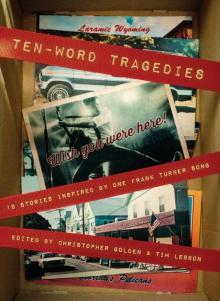 Ten-Word Tragedies
Ten-Word Tragedies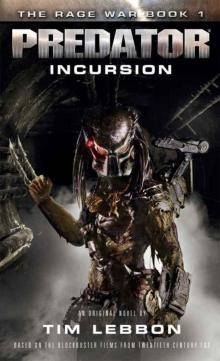 Predator: Incursion
Predator: Incursion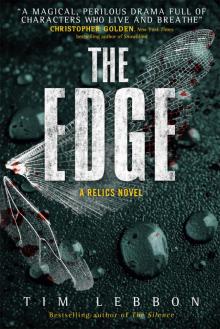 Relics--The Edge
Relics--The Edge Firefly
Firefly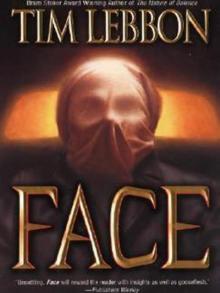 Face
Face Generations
Generations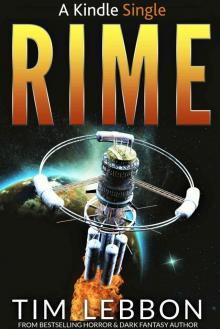 RIME (Kindle Single)
RIME (Kindle Single) Fallen
Fallen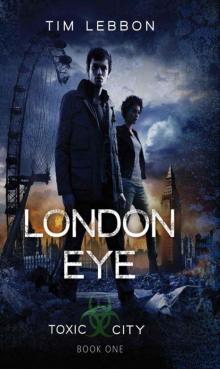 London Eye tc-1
London Eye tc-1 Kong: Skull Island
Kong: Skull Island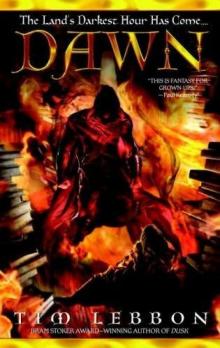 Dawn n-2
Dawn n-2 Into the Void: Star Wars (Dawn of the Jedi)
Into the Void: Star Wars (Dawn of the Jedi)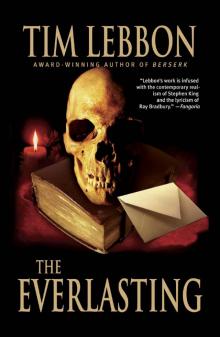 The Everlasting
The Everlasting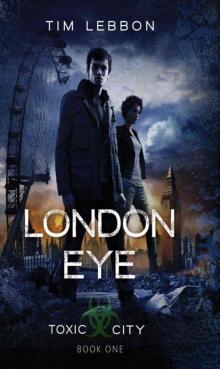 London Eye: 1 (Toxic City)
London Eye: 1 (Toxic City)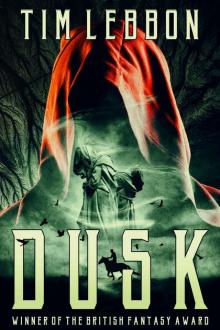 Dusk: a dark fantasy novel (A Noreela novel)
Dusk: a dark fantasy novel (A Noreela novel)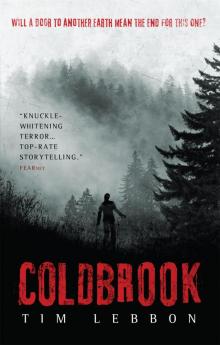 Coldbrook
Coldbrook Alien
Alien Dusk
Dusk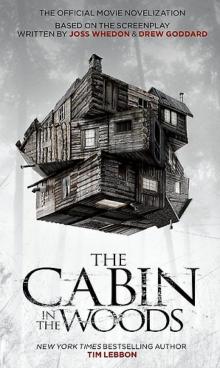 The Cabin in the Woods
The Cabin in the Woods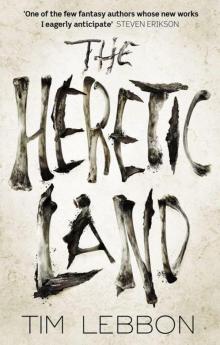 The Heretic Land
The Heretic Land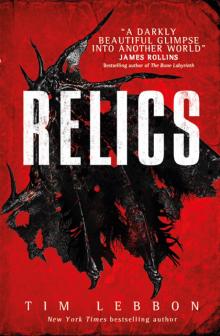 Relics
Relics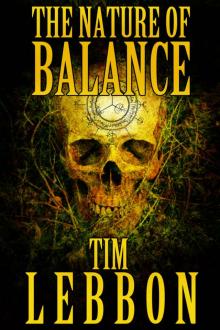 The Nature of Balance
The Nature of Balance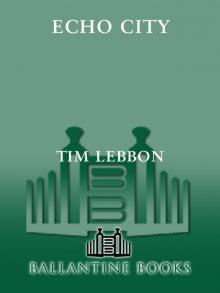 Echo City
Echo City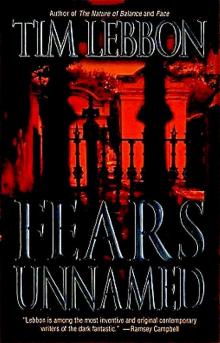 Tim Lebbon - Fears Unnamed
Tim Lebbon - Fears Unnamed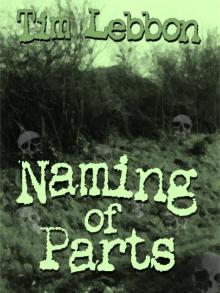 Naming of Parts
Naming of Parts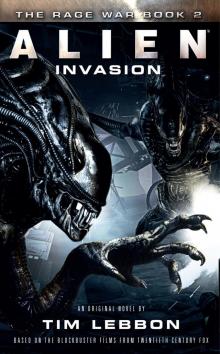 Alien--Invasion
Alien--Invasion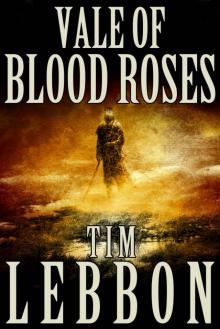 Vale of Blood Roses
Vale of Blood Roses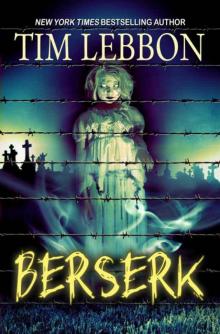 Berserk
Berserk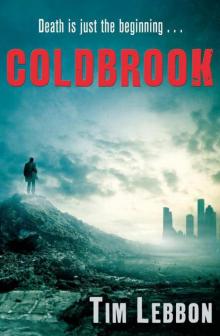 Coldbrook (Hammer)
Coldbrook (Hammer)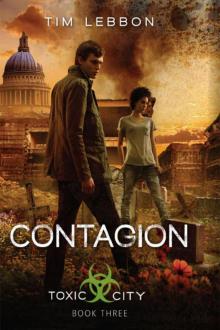 Contagion tc-3
Contagion tc-3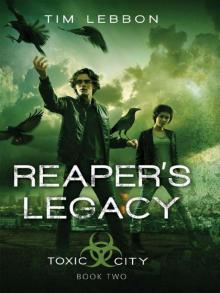 Reaper's Legacy: Book Two (Toxic City)
Reaper's Legacy: Book Two (Toxic City)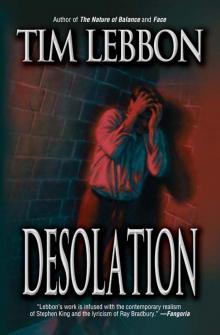 Desolation
Desolation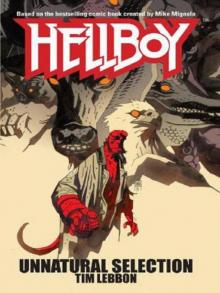 Unnatural Selection
Unnatural Selection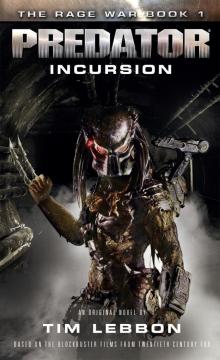 Predator - Incursion
Predator - Incursion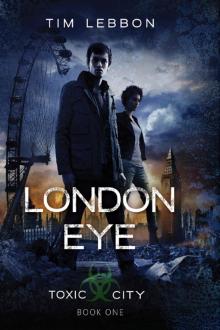 London Eye
London Eye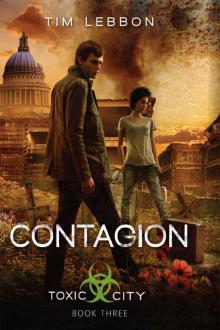 Contagion (Toxic City Book Three)
Contagion (Toxic City Book Three) The Silence
The Silence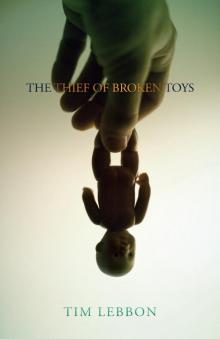 The Thief of Broken Toys
The Thief of Broken Toys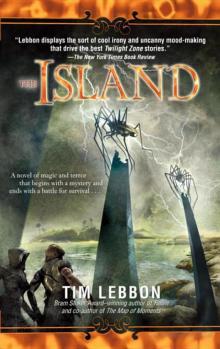 Tales of Noreela 04: The Island
Tales of Noreela 04: The Island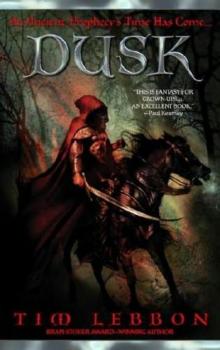 Dusk n-1
Dusk n-1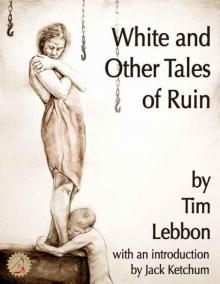 White and Other Tales of Ruin
White and Other Tales of Ruin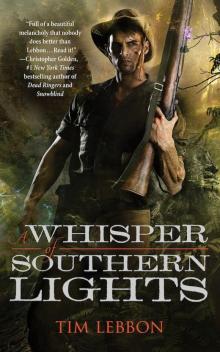 A Whisper of Southern Lights
A Whisper of Southern Lights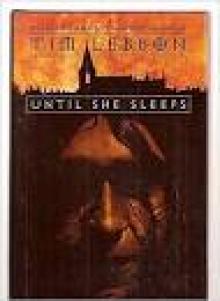 Until She Sleeps
Until She Sleeps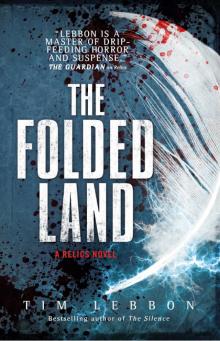 Relics--The Folded Land
Relics--The Folded Land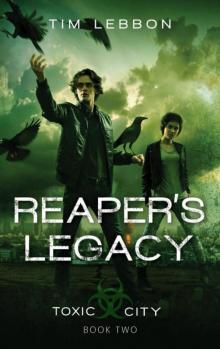 Reaper's Legacy tc-2
Reaper's Legacy tc-2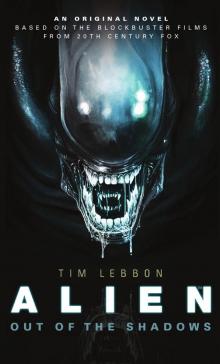 Alien: Out of the Shadows
Alien: Out of the Shadows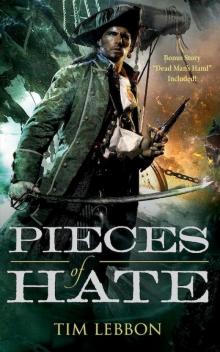 Pieces of Hate
Pieces of Hate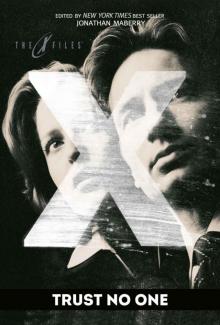 X-Files: Trust No One
X-Files: Trust No One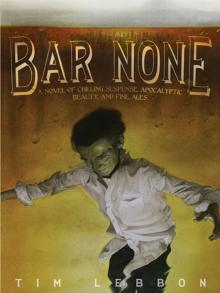 Bar None
Bar None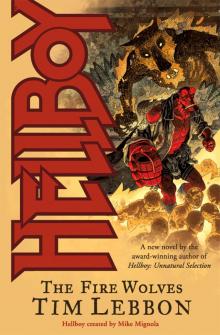 The Fire Wolves
The Fire Wolves